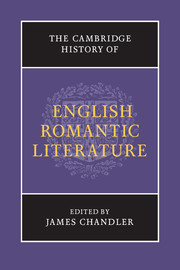Book contents
- Frontmatter
- Introduction
- Part I The Ends of Enlightenment
- Part II Geographies: The Scenes of Literary Life
- Part III Histories: Writing in the New Movements
- Part IV The Ends of Romanticism
- 25 Representation restructured
- 26 Romantic cultural imperialism
- 27 Romanticism and religious modernity: from natural supernaturalism to literary sectarianism
- 28 Is Romanticism finished?
- Chronology
- Bibliographies
- Index
- 1 A New Pocket Map of the Cities of London and Westminster; with the Borough of Southwark, Comprehending the new Buildings and other Alterations, 3rd edn (London: William Faden, 1790).">
- References
28 - Is Romanticism finished?
from Part IV - The Ends of Romanticism
Published online by Cambridge University Press: 28 May 2009
- Frontmatter
- Introduction
- Part I The Ends of Enlightenment
- Part II Geographies: The Scenes of Literary Life
- Part III Histories: Writing in the New Movements
- Part IV The Ends of Romanticism
- 25 Representation restructured
- 26 Romantic cultural imperialism
- 27 Romanticism and religious modernity: from natural supernaturalism to literary sectarianism
- 28 Is Romanticism finished?
- Chronology
- Bibliographies
- Index
- 1 A New Pocket Map of the Cities of London and Westminster; with the Borough of Southwark, Comprehending the new Buildings and other Alterations, 3rd edn (London: William Faden, 1790).">
- References
Summary
Villon and Borgia – Sidonia, Lovelace, Becky Sharp, Heathcliff, and, supremely, the Divine Marquis Himself! How much better these demonic creatures than the Pale Galilean who tormented them with the platitudes of his wretched moral codes and those ‘forms of worship’ Blake banished forever to a darkness deeper than Stygian, wider than Chaos. How much better and – better yet, Thank Somebody! – how much worse!
(A. C. Swinburne to D. G. Rossetti, 1 April 1866, Easter Sunday)Is Romanticism finished? Such is the question posed for me by the editor of this volume. Cultural observers like ourselves, the essayists in this book, have a certain professional investment in answering that question negatively. ‘Certainly not, Romanticism flourishes, its forms are central to the best that has been known and thought etc. etc.’ And if that way of thinking has been, if it be, but a vain belief, how often have our spirits turned to it – how often, in how many days and ways!
‘Is Romanticism finished?’ No? YES, according to one of our age’s defining cultural spokespersons. It is and always has been and always will be. Death and loss are the glory of a Romantic imagination. ‘Romanticism is a doomed tradition, yet a perpetually self-renewing one.’ It’s been a long-lived and persuasive view – Romanticism as the land of the last and the lost. Look up, there’s that great Romantic figure, Prometheus.
Keywords
- Type
- Chapter
- Information
- The Cambridge History of English Romantic Literature , pp. 648 - 664Publisher: Cambridge University PressPrint publication year: 2009
References
- 2
- Cited by

